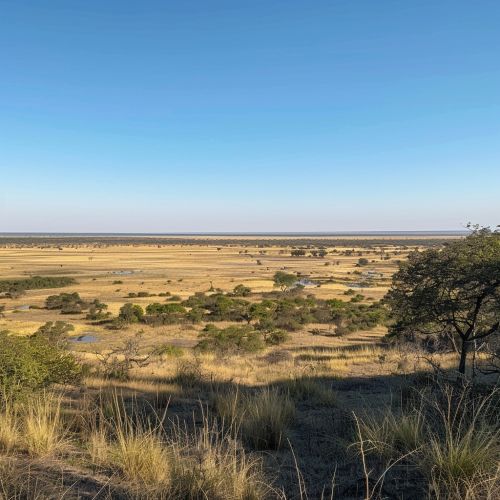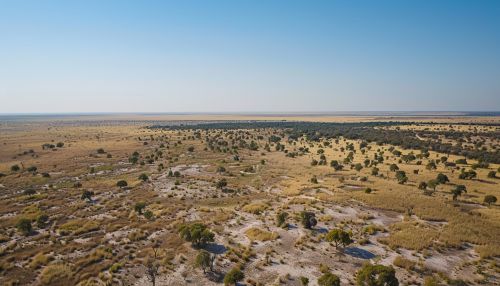Botswana
Geography
Botswana, officially the Republic of Botswana, is a landlocked country located in Southern Africa. It is bordered by South Africa to the south and southeast, Namibia to the west and north, and Zimbabwe to the northeast. Its border with Zambia to the north near Kazungula is poorly defined but is, at most, a few hundred meters long.


The country is predominantly flat, tending toward gently rolling tableland. Botswana is dominated by the Kalahari Desert, which covers up to 70% of its land surface. The Okavango Delta, one of the world's largest inland deltas, is in the northwest. The Makgadikgadi Pan, a large salt pan, lies in the north.
History
The history of Botswana starts more than 100,000 years ago, when the first humans inhabited the region. The original inhabitants of southern Africa were the Bushmen (San) and Khoe peoples. Both speak Khoisan languages and lived as hunter-gatherers. About a thousand years ago, large chiefdoms emerged that were later eclipsed by the Great Zimbabwe empire, which spread into eastern Botswana.
Modern-day Botswana was part of the British protectorate of Bechuanaland. Botswana gained independence from Britain on 30 September 1966. It has since maintained a strong tradition of stable representative democracy, with a consistent record of uninterrupted democratic elections.
Politics and Government
Botswana is a representative democratic republic with a multi-party system. The President of Botswana is both head of state and head of government. Executive power is exercised by the government while legislative power is vested in both the government and the Parliament of Botswana.
The most recent general elections were held on 23 October 2019. The Botswana Democratic Party, led by President Mokgweetsi Masisi, won the majority of the seats in the National Assembly and Masisi was subsequently sworn in for his first full term as President.
Economy
Botswana has a mixed economy with a high gross national income, making it one of the wealthiest countries in Africa. The country's high gross domestic product (GDP) per capita does not reflect the high income inequality, which skews distribution of wealth and quality of life.
Since independence, Botswana has had one of the fastest growth rates in per capita income in the world. Botswana has transformed itself from one of the poorest countries in the world to an upper middle-income country. Although Botswana was resource-abundant, a good institutional framework allowed the country to reinvest resource-income in order to generate stable future income.
The economy is dominated by mining, cattle, and tourism. Botswana boasts a GDP (purchasing power parity) of about $18.825 billion per year as of 2015, which is one of the highest in Africa. Its high gross national income (by some estimates the fourth-largest in Africa) gives the country a relatively high standard of living and the highest Human Development Index of continental Sub-Saharan Africa.
Culture
Botswana's culture is rich and diverse, with a blend of ethnicities, languages, and customs. The country's primary ethnic group is the Tswana people, who make up about 79% of the population. Other ethnic groups include the Kalanga, Basarwa, and Kgalagadi.
Botswana's traditional music is mostly vocal and performed, sometimes accompanied by the mbira or the kora. The country's popular music recording industry is growing and includes artists such as Vee Mampeezy, Machesa Traditional Troupe, Culture Spears, Jujuboy, and Maxy.
In literature, Bessie Head is Botswana's most widely recognized author, though the country has produced a number of other writers of note. Botswana's oral tradition is significant, with folk tales, proverbs, and songs.
